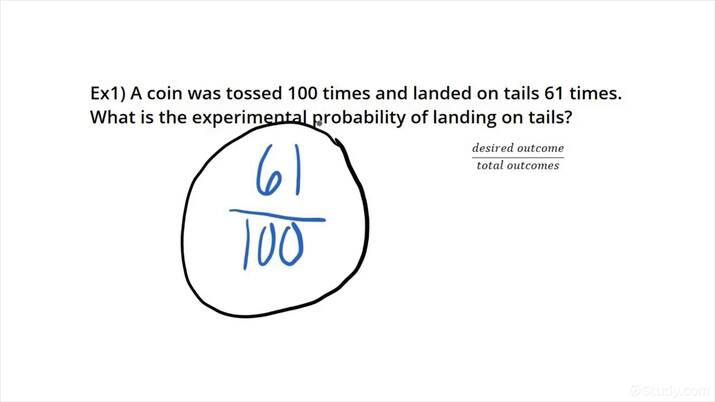Experimental probability definition
Assume that a train is two hours late due to heavy weather, and that the train is scheduled to arrive at the station at p.
You and your 3 friends are playing a board game. Now, is it possible that upon rolling the die you will get an exact 5? No, it is a matter of chance. We face multiple situations in real life where we have to take a chance or risk. Based on certain conditions, the chance of occurrence of a certain event can be easily predicted. In simple words, the chance of occurrence of a particular event is what we study in probability. Probability, a branch of Math that deals with the likelihood of the occurrences of the given event.
Experimental probability definition
In mathematics, probability refers to the chance of occurrence of a specific event. Probability can be measured on a scale from 0 to 1. The probability is 0 for an impossible event. The probability is 1 if the occurrence of the event is certain. There are two approaches to study probability: experimental and theoretical. Suppose you and your friend toss a coin to decide who gets the first turn to ride a new bicycle. Can you guess who will win? This is theoretical since you are predicting the outcome based on what is expected to happen and not on the basis of outcomes of an experiment. So, what is the experimental probability? Experimental probability is calculated by repeating an experiment and observing the outcomes.
Share your suggestions to enhance the article.
In probability theory , an experiment or trial see below is any procedure that can be infinitely repeated and has a well-defined set of possible outcomes , known as the sample space. A random experiment that has exactly two mutually exclusive possible outcomes is known as a Bernoulli trial. When an experiment is conducted, one and only one outcome results— although this outcome may be included in any number of events , all of which would be said to have occurred on that trial. After conducting many trials of the same experiment and pooling the results, an experimenter can begin to assess the empirical probabilities of the various outcomes and events that can occur in the experiment and apply the methods of statistical analysis. Random experiments are often conducted repeatedly, so that the collective results may be subjected to statistical analysis. A fixed number of repetitions of the same experiment can be thought of as a composed experiment , in which case the individual repetitions are called trials.
In mathematics, probability refers to the chance of occurrence of a specific event. Probability can be measured on a scale from 0 to 1. The probability is 0 for an impossible event. The probability is 1 if the occurrence of the event is certain. There are two approaches to study probability: experimental and theoretical.
Experimental probability definition
If you're seeing this message, it means we're having trouble loading external resources on our website. To log in and use all the features of Khan Academy, please enable JavaScript in your browser. Search for courses, skills, and videos. Probability models. About About this video Transcript. Compare expected probabilities to what really happens when we run experiments. Want to join the conversation? Log in.
Who voices scarab
Once again, if in theory the coin is definitely fair, it's a fair coin and it's flipped in a very fair way, then this is true. Learn more such interesting concepts at SplashLearn. Even the makeup of your football team might have changed. The probability function P is defined in such a way that, if the experiment were to be repeated an infinite number of times, the relative frequencies of occurrence of each of the events would approach agreement with the values P assigns them. Math Polynomials. The values lie between the numbers 0 and 1. Statistical Term- Bias. Over a period of working days, on his way to work, he had to wait for a train at the railway crossing for 68 days. The experimental probability describes the experiment's actual outcome. Experimental probability is widely used in research and experiments in various fields, such as medicine, social sciences, investing, and weather forecasting. Either heads will be on top or tails will be on top. Consider an experiment of rotating a spinner 50 times.
The chance or occurrence of a particular event is termed its probability. The value of a probability lies between 0 and 1 which means if it is an impossible event, the probability is 0 and if it is a certain event, the probability is 1.
Demonstration The more times the spinner is spun, the closer the values of the experimental probabilities get to the values of the theoretical probabilities of landing in each sector. What is the experimental probability that John will kick a field goal during the game? What is the experimental probability of choosing a boy in the next event? Now, what is the experimental probability of getting heads? Save Article Save. The following can be found on an exotica pizza:. Mark Geary. Based on past experience, we can make reasonable estimates of the likelihood of future events. If we tossed a coin 10 times and recorded a head 4 times and a tail 6 times then the Probability of Occurrence of Head on tossing a coin:. Experimental Probability. Contribute to the GeeksforGeeks community and help create better learning resources for all. So all of this has to be taken with a grain of salt. Ex- I played 16 games so far.


You are not right. I am assured. I can prove it.
I am sorry, that I interrupt you, but you could not paint little bit more in detail.